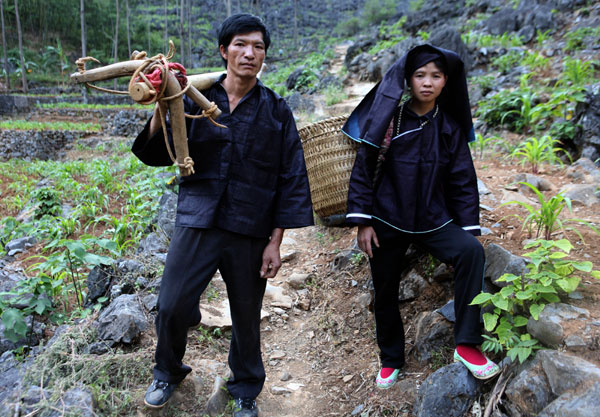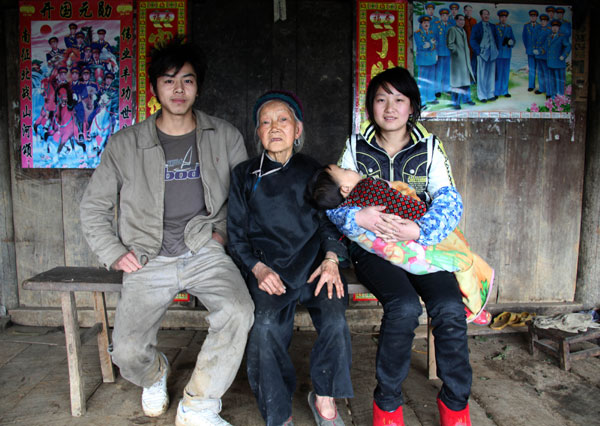Cultural blackout
Updated: 2011-11-26 07:59
By Sun Li (China Daily)
|
|||||||||
|
Dark Cloth Zhuang couple Liang Wenbing (left) and Wang Xiumei wear the traditional black clothes from which their ethnic group takes its namesake. Huo Yan / China Daily |
|
Dark Cloth Zhuang youth Liang Yunzhong (left) poses with his mother and wife, an ethnic Han woman. |
Few among the Dark Cloth Zhuang still wear the ethnicity's namesake sable clothing. Sun Li reports.
The Dark Cloth Zhuang branch of the Zhuang ethnic group has been characterized for centuries by their namesake sable clothing and taboos against marrying outsiders.
But that's changing as relentless waves of modernization wash over this remote mountainous swath of the Guangxi Zhuang autonomous region.
Chief of Napo county's Gonghe village Liang Jincai says the more than 51,800 locals used to wear black clothes year-round.
"They used to always wear their black kerchiefs, long-sleeved black shirts and wide-legged black trousers - no matter what," the 72-year-old says.
"But now, only old men wear black clothes all the time. The youth only wear them on important days, such as weddings and Spring Festival."
The Dark Cloth Zhuang came to be as a people when they sought refuge in the secluded mountains as war refugees.
According to legend, the chief was critically injured while battling invaders and treated himself with indigo. After surviving to lead the victory, the chief ordered his people to grow indigo and use it to dye their clothes black.
"It's a tragedy our time-honored veneration of black is fading," 72-year-old villager Wang Meifeng says.
One reason is the black clothes are difficult and time-consuming to make, she explains.
"You have to first grow cotton, get rid of the seeds and spin it before using indigo to dye it," Wang says.
"Sometimes, it takes a whole year."
Clothing from outside markets is cheaper, more convenient to get and more aesthetically intriguing to many, she explains.
"Clothes from outside come in all sorts of shapes and colors, and cost about 100 yuan, while traditional clothes cost about 300 yuan when you add up the materials, time and everything else," Wang says.
"So, why wouldn't we wear clothes from outside?"
The transformation began in the 1980s, when many community members became migrant workers in other provinces, 50-year-old Gonghe villager Liang Xiuzhen says.
Gonghe villager Ma Wengying says the outflow of migrant workers from the community came about because of the hardships of subsisting on corn and cattle.
By and large, the only people left in the village are children and the elderly, the 42-year-old says.
Liang Xiuzhen recalls feeling awkward wearing traditional garb in the cities.
"When I went outside our county wearing my black outfit, people would stare at me like I was a weirdo - even in Guangxi," she recalls.
"I could only imagine how people would look at me if I went to other provinces. So we have to wear other clothes when we step out of our community. And many people return with jeans, shirts and jackets that make the Dark Cloth Zhuang people look like anyone in any city."
Nuptial customs also liberalized with the 1980s' outflow of villagers seeking work outside.
Liang Jincai believes the taboos surrounding marrying outsiders likely originated from longtime cultural seclusion and a desire for ethnic purity.
"The rule was so strict that if a Dark Cloth Zhuang man was living anywhere else in the world and never planned to return, he still had to find a Dark Cloth Zhuang woman to marry," he recalls.
Liang Yunzhong is among the youth who are violating the nuptial restrictions.
The 22-year-old married a 19-year-old colleague from Hubei's provincial capital Wuhan, whom he met while working at a paper mill in Guangdong's provincial capital Guangzhou.
"I left home alone and didn't know where other Dark Cloth Zhuang are in Guangzhou," Liang Yunzhong says.
"If I hadn't married a woman from another ethnic group, I would have been a leftover man (middle-aged bachelor)."
He says his is one of several similar cases in the village. And his parents approve.
"They understand the situation and are not zealous about traditional purity," Liang Yunzhong says. "And my wife has adapted to our different environment and customs since coming here."
Liang Jincai, the village leader, expresses mixed feelings about the transformations.
"I believe more people from other ethnic groups will join our community," he says.
"The Dark Cloth Zhuang will no longer be called as such, as fewer people wear black clothes in the future. Our traditional attire and marriage customs will become only memories. But that doesn't mean our people will fade away."
Huang Zhaohua contributed to the story.













